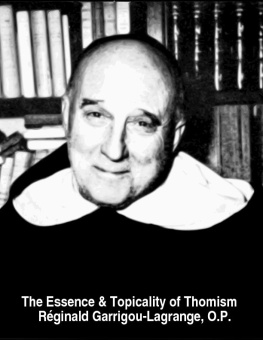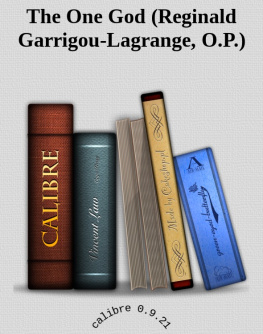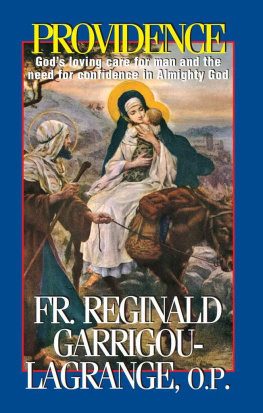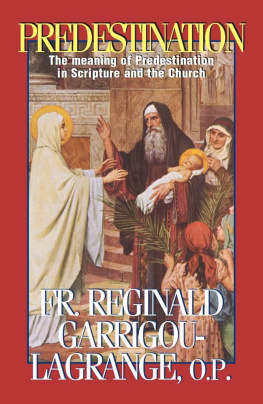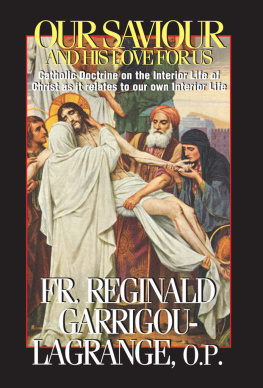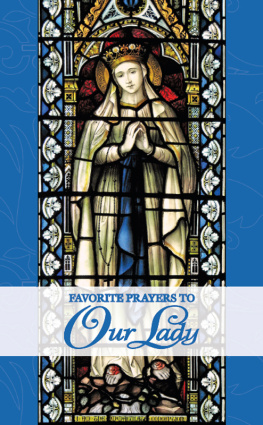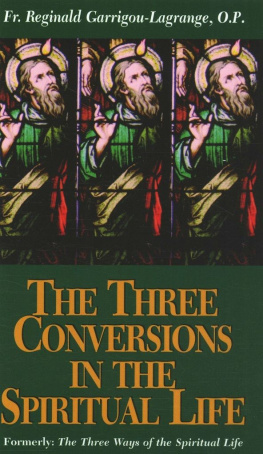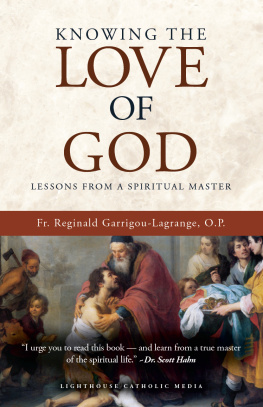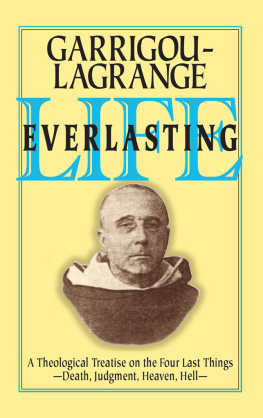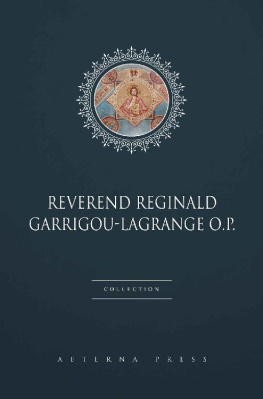Garrigou-Lagrange - The Essence & Topicality of Thomism
Here you can read online Garrigou-Lagrange - The Essence & Topicality of Thomism full text of the book (entire story) in english for free. Download pdf and epub, get meaning, cover and reviews about this ebook. year: 2014, publisher: Lulu.com, genre: Science. Description of the work, (preface) as well as reviews are available. Best literature library LitArk.com created for fans of good reading and offers a wide selection of genres:
Romance novel
Science fiction
Adventure
Detective
Science
History
Home and family
Prose
Art
Politics
Computer
Non-fiction
Religion
Business
Children
Humor
Choose a favorite category and find really read worthwhile books. Enjoy immersion in the world of imagination, feel the emotions of the characters or learn something new for yourself, make an fascinating discovery.
- Book:The Essence & Topicality of Thomism
- Author:
- Publisher:Lulu.com
- Genre:
- Year:2014
- Rating:5 / 5
- Favourites:Add to favourites
- Your mark:
- 100
- 1
- 2
- 3
- 4
- 5
The Essence & Topicality of Thomism: summary, description and annotation
We offer to read an annotation, description, summary or preface (depends on what the author of the book "The Essence & Topicality of Thomism" wrote himself). If you haven't found the necessary information about the book — write in the comments, we will try to find it.
The Essence & Topicality of Thomism — read online for free the complete book (whole text) full work
Below is the text of the book, divided by pages. System saving the place of the last page read, allows you to conveniently read the book "The Essence & Topicality of Thomism" online for free, without having to search again every time where you left off. Put a bookmark, and you can go to the page where you finished reading at any time.
Font size:
Interval:
Bookmark:
The Essence and Topicality of Thomism
R ginald Garrigou-Lagrange, O.P.
Professor of Dogmatics in the Theology Faculty of the Angelicum at Rome
Fr. Michael Browne O.P., Master of Sacred Theology
Fr. Rosarin Gagnebet O.P., doctor of Sacred Theology
Imprimi potest
Fr. M. Sp. Gillet O.P., Master General , St. Sabina, Rome, 6 May 1947.
Imprimatur
Brescia, 13 December 1945
Mgr. Ern. Pasini Vic. Gen.
Translation 2013 Alan Aversa
e-ISBN 978-1-304-41674-2
print ISBN 978-1-304-41618-6
Garrigou-Lagrange, Rginald, O.P. (1877-1964)
- Thomas Aquinas, Saint, 1225?-1274
- Modernism (Christian theology) Catholic Church
B765.T54 2013
Translators Note : Essence and Topicality of Thomism is a translation of Essenza e attualit del tomismo (Brescia: La Scuola editrice, 1946). Some translations of St. Thomas come from the works mentioned in Th rse M. Bonin, Thomas Aquinas in English: A Bibliography, January 31, 2020, https://aquinas-in-english.neocities.org/ . All others are the translators. A dditional footnotes are also the translators. The second part was translated from Italian with comparisons to the Latin original. Lastly , the translator uses potentiality and actuality to refer to what traditionally has been called, somewhat confusingly for novices, potency ( potentia ) and act ( actus ), respectively.
Certain souls today think that a theology which is not current is a false theology and that the theology of Saint Thomas in some of its important partse.g., when it conceives sanctifying or habitual Grace as a formis only an application of the notions of Aristotelian physics, of the distinction between matter and form. And it is added: Renouncing Aristotelian physics, modern thought has also deserted the notions and schemes that have value only for Aristotelian physics. Because theology continues to offer meaning to the spirit and can fertilize and progress with it, it is necessary that it renounces these notions.
The theology of Saint Thomas, however, from d this point of view, would no longer be current. And elsewhere it is also said: A theology that is not current is therefore false.
But why, then, would the Church recommend the doctrine of Saint Thomas to the point of insisting that professors of philosophy and theology teach this discipline ad Angelici Doctoris rationem, doctrinam et principia, eaque sancte teneant ?
The Christian truth, it is observed, is stuck in contingent notions and schemes which determine its rational structure. It is not possible to isolate it from them. It is not rendered independent from a system of notions but changing into another. Historyneverthelessdoes not lead to relativism. It permits the grasping, in the bosom of theological evolution, of an absolute. Not an absolute of description , but an absolute of affirmation. If the notions, methods, systems change ; the affirmations that they contain remain, even if they are expressed in other categories.
The present opusculum without which it is impossible to have a correct idea of God, the soul, the worl d because the doctrine of St. Thomas is moreover a philosophical defense of the real value of the first truths taught by common sense, which does not know how to defend itself alone.
In fact, the principle s of Thomistic philosophy surpass Aristotelian physics; (this is not the moment to show the value of hylemorphism in itself or in another), the principle of efficient causality, and that of finality dominate the order of bodies with which physics is occupied, and they permit us to raise ourselves to the sure knowledge of God; they apply to the supernatural world as to the natural world.
The distinction between potentiality and actuality that first arises for explaining the becoming of bodies is not only a distinction in the physical order , but also in the metaphysical order; it is a first division of intelligible being, and upon it rests the proofs of the existence of God which Saint Thomas conceived. If it does not have an immutable value, these proofs are no longer demonstrative, but only probable.
What , moreover, we wish to recall here is that the immutable affirmations of the Christian Truth cannot be maintained if some immutable notions are not admitted.
Affirmation, in fact, is a judgment that reunites two notions, e.g.: sanctifying grace is distinct from the nature of the soul. If these two notions are not immutable, then the judgment could not be immutable either.
But the first notions of natural reason or common sense are at first confused , and it is only by long and methodical philosophical work that they become distinct notions of philosophical reason, as Saint Thomas shows in his Commentary on Book II of Aristotles Posterior Analytics . So all men have used the verb can , saying, e.g., that matter can becomeby nutritive assimilationplant, animal, or human flesh. Thus, everyone says that the human intellige nce can easily know the first principles and the conclusions that immediately derive therefrom . Everyone speaks of this ability. But the philosophical thinker passe s slowly from this confused notion of the ability or potential to the distinct notion of the active or passive potential, and to that of actuality.
Now, if they dismiss these not only physical but also metaphysical notions, of potentiality and actuality, how does one maintain and defend the real value of the confused notions from which they derive and without which it is no longer possible to maintain the ontological and immutable value of the first principles of thought and reality?
How, without these notions of potentiality and actuality, does one reconcile the principle of non-contradiction or identity with the becoming and multiplicity of beings?
To dismiss the first principles of Thomistic metaphysics would be to increase considerably the current confusion of souls; it would lead us to another definition of truth in the domain of theology and, finally, in that of faith. It is in this superior domain that one must say: For the abstract and chimerical adquatio rei et intellectus Now, it is with a great responsibility to call chimerical a definition of truth admitted by many ages in the Church and to want to substitute another for it.
Is the life of which one speaks in this new definition of truth human life? If so, how does one avoid the condemned Modernist proposition: Veritas non est immutabilis plus quam ipse homo, quippe qu cum ipso, in ipso et per ipsum evolvitur ? (Denz., 2058).
The philosophy of Action in the Revue Thomiste (1896 p. 36 ff., 413; 1897 p. 62, 239, 627; 1898 p. 578) is , in conclusion, what since 1896 our Master, Father Schwalm, O.P., has reproached and what we also have said in 1913 (p. 351-371) and since then have not ceased to repeat.
We recall what [St.] Pius X had to write regarding the Modernists: ternam veritatis notionem pervertunt Encyclical. Pascendi (Denz., 2080). How does one avoid this error when one pretends that the Christian claims can only be explained in ever-changing notions, if it is said that the Christian truth is always stuck in contingent notions and schemes which determine its rational structure?
Now, there cannot be any immutability in the most universally admitted theological conclusions. And even in the conciliar definitions , which utilize the most precise notions of common sense, there will always be something mutable , which will cease for it to be true. And, then, in these definitions , where does the immutable truth end, and where does what must change begin? Who will say it? The Church itself, from this perspective, could not respond.
Is it not perhaps to ascribe the Christian faith to a religious experience that is always evolving, expressing itself intellectually in ever new forms? We recall what the Modernists have said regarding some dogmatic formul (cf. Denzinger, 2077). By them the believer believes his own religious experience and expresses it, at first, in simple and ordinary formul, and then in secondary formul that, if the Church approves them, are called dogmatic formul . These do not have any other purpose than to help the believer believe his religious experience. Dogmatic formul do not have an absolute value with respect to divine reality, but only a practical value: Actuality with respect to Christ as with respect to God. These formul are vehicles of truth and are mutable; one thereby arrives at intrinsic evolution of dogma, the Encyclical Pascendi (Denz. 2077) says, that destroysit saysthe immutability of Christian truth. One arrives at asserting that certain dogmas disappear because they are no longer current ; they are no longer considered true : e.g., that of eternal punishment (cf. Denz. 2080).
Font size:
Interval:
Bookmark:
Similar books «The Essence & Topicality of Thomism»
Look at similar books to The Essence & Topicality of Thomism. We have selected literature similar in name and meaning in the hope of providing readers with more options to find new, interesting, not yet read works.
Discussion, reviews of the book The Essence & Topicality of Thomism and just readers' own opinions. Leave your comments, write what you think about the work, its meaning or the main characters. Specify what exactly you liked and what you didn't like, and why you think so.

